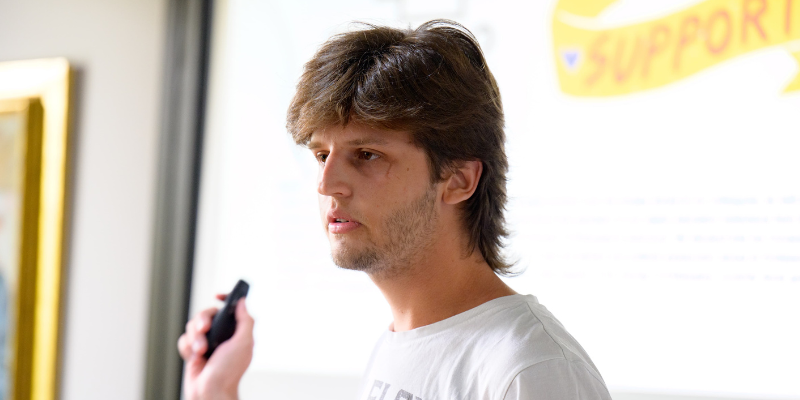Student and journalist Božidar Milovac: “The future of Serbian media depends on the outcome of the protests”

In the lead-up to the one-year anniversary of the Novi Sad railway canopy collapse, which killed 16 people on 1 November 2024, the European Federation of Journalists (EFJ) spoke with Božidar Milovac, a Serbian student and journalist from Novi Sad. While Milovac usually reports on politics and social issues for several media outlets, he has spent the past year primarily covering the massive anti-corruption protests that erupted after the tragedy. These protests have been marked by widespread attacks and violence against journalists. Milovac is no exception: he has been hindered in his work, including verbal intimidation, and had his phone snatched. In this interview, he shares his experience as both a journalist and student during the protests, and reflects on the future of free and independent media in Serbia.
In the context of the protests, how do you seek the balance between your work as a journalist and your personal opinions?
Božidar Milovac: That was very difficult. Of course, every young, educated person wants to live in a free society despite ideological differences. I believe that everyone supports students’ goals in theory but as journalists, we made the decision not to publicly express our beliefs. That was one of the most difficult choices to make last year but we stand by it. We believe that media work is just as important for building a free and democratic society.
Do you think this attachment to media freedom is shared by most young people in Serbia?
I think everyone used to think that young people weren’t interested in anything and were living in their own personal bubbles. But this past year has proven that idea wrong. In an article I wrote about how journalists support each other, I dedicated a section to the support that students and young people have expressed for free and independent media. For example, when the president and the police targeted female journalists in Niš, students organised a protest in support, denouncing the president’s speech as unacceptable. Students showed their support again when N1 was under a blockade by pro-government people. Overall, young people understand much better than we thought they did. It turns out that doing your work professionally and properly greatly affects how people understand its value.
Could you describe the current atmosphere during protests? How are these protests different from previous ones?
The atmosphere has changed quite a bit. When I started working in 2022–23, you didn’t have to prepare much for reporting on a protest, as long as you had a press card and a functioning camera. There was no physical intimidation. The situation has worsened since 1 November, becoming increasingly violent, because the government is clearly splitting society into two – those who support the students and those who support the ruling party. A colleague of mine was kicked in the stomach by a police officer, while I had my phone taken away for nearly two minutes. While this would be a serious issue in other countries, in the current context, it is the least important thing happening here. Earlier this year, a journalist who also works as a professor at my university was the target of a smear campaign. He received a written death threat at the entrance to his building. This is the result of years of demonising the media, especially free media, and anybody who is critical of the regime.
Over the past year, we have indeed reported many attacks on journalists on the Mapping Media Freedom platform. What support do journalists receive? How are the authorities handling cases of threats and attacks?
Most public authorities do not answer our requests, and when cases go to court, they are delayed. This encourages threats against the free press and anyone not affiliated with the ruling party. The police rarely respond or communicate, except the statements they send to every media outlet when an issue affects their interests significantly. The only ways to report attacks are through journalists’ associations, which are doing a great job, and by going to court. From my personal experience, NUNS and UNS have my number and every time something happens, they will call me to check that I am okay and ask if I need any support.
On a personal level, what keeps you going despite this rather bleak picture?
I have no idea! I guess we are all getting used to it, and we have all committed ourselves to living in this constant stressful climate. I try my best to stay okay, and the people I surround myself with are really important. You just need to enjoy the little things that remind you of normal life. We all knew what we were getting into, but we still decided to go ahead with it. As journalists, we know very well the kind of society we are trying to build. Now, we are more determined than ever to do our job properly. They can’t scare or threaten us because what we believe in is stronger than what they do.
What stands out to you from this year?
I’m so impressed by the solidarity among journalists in Serbia right now. In Novi Sad, journalists discussed in a group chat how to cover protests, coordinating everything from the front to the end of the march. The goal is to ensure everyone’s safety. I can’t imagine this level of solidarity happening anywhere else.
How do you see the future of independent journalism in Serbia?
I think the future of the media depends on the outcome of the protests. The current movement will completely define our future. If the government remains in power, we will continue to see direct attacks on the media. If the protests are successful, it will be our duty to build a society that values free media. It is difficult to discuss the future of the media without considering how the protests will end.






